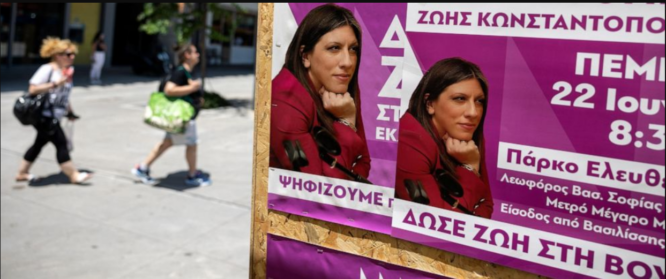Greece’s political edges are more quaint than threatening with the Nazi-inspired Golden Dawn party dissolved, its leadership in prison, and the anti-Western left defanged.
Despite a return to mainstream politics as Greece’s 10-year financial crisis heals, up to five minor parties—three on the extreme right and two on the far left—could perhaps achieve the 3% threshold in Sunday’s rerun elections.
That would raise the number of parties in Parliament from five to nine, eroding the center-right New Democracy, or ND, which is projected to keep its 20-percentage-point advantage from a first vote last month but wants an absolute majority to prevent coalitions. If ND can’t rule alone, it may call a third election during August’s high vacation season.
“The small parties’ performance will affect the outcome, as the more parties that manage to elect lawmakers, the higher the threshold for ND to win a majority,” said Teneo analyst Wolfango Piccoli.
“Moreover, more fringe parties into Parliament—especially from the extreme right spectrum—could complicate the legislative process over the next four years.”
Both reflect views unfamiliar to most Greeks, but they’re far from the thuggery-prone, Nazi-mimicking Golden Dawn elected to Parliament four times during the 2009-2018 financial crisis, becoming the country’s third-largest party.
Golden Dawn collapsed after a party organizer killed a left-wing musician: The party’s leadership was arrested and imprisoned for criminal activity.
A former top Golden Dawn official has sponsored the little-known Spartans party, whose insignia is a far-right Greek crested helmet. Nationalist, anti-immigration groups are increasingly polling close to Parliament.

Elliniki Lysi is the fringe right’s most likely representative. Kyriakos Velopoulos, 57, promotes historical and religious literature and alternative remedies on rural Greek TV.
“Many extreme voices in Parliament could lead to a democratic cacophony,”
The party supports forcibly returning asylum-seekers to Turkey at the border and imprisoning escapees on remote islands.
Niki seeks “to unite all Greeks who nourish patriotic and Orthodox beliefs” via Greek Orthodox Christianity. Dimitrios Natsios, 58, leads the 2019 party.
Monks on Mount Athos, a northern Greek independent monastic community where women have been forbidden for a millennium, have supported it. Russia is a strong Orthodox Christian power. Greece’s Church leadership has categorically rejected politics.
Niki’s power base is northern Greece, where many appreciate its rejection of the 2018 accord that ended a decades-old identity conflict with neighboring North Macedonia.
ND leader Kyriakos Mitsotakis encouraged northern voters to ignore far-right appeals.
Giorgos Floridis, a former Socialist Cabinet minister from Kilkis, northern Greece, a Niki stronghold, told The Associated Press that Niki is founded in pandemic-era antivaccination organizations.
Floridis claimed several monasteries, including ones on Mount Athos, are pro-Russian. Russia likes this party because it expresses its ideas.
Theologian and retired police officer Ilias Theoharakis, Niki’s top Kilkis candidate, called pro-Russian accusations “a joke.”
“Soon, they’ll say I’m a KGB agent,” he joked to the AP. We’re pro-vaccine. We respect everyone’s right to choose.”
He said, “That’s a personal question, but I haven’t.”
The two far-left parties polling about 3% are breakaway groups that abandoned the major opposition Syriza party after its 2015 decision to accept a second international bailout months after being elected on promises to halt bailout-linked austerity.
Zoe Konstantopoulou, leader of Plefsi Eleftherias, or Passage to Freedom, was parliament speaker under Syriza, whereas Yanis Varoufakis, 62, secretary of European Realistic Disobedience Front or MeRA25, was finance minister during the 2015 bailout stalemate.
Plefsi Eleftherias leads the polls for Parliament. If elected, 46-year-old lawyer Konstantopoulou promises “a lively opposition” in Parliament.
“We will make their life difficult,” she declared. “No peace.”

